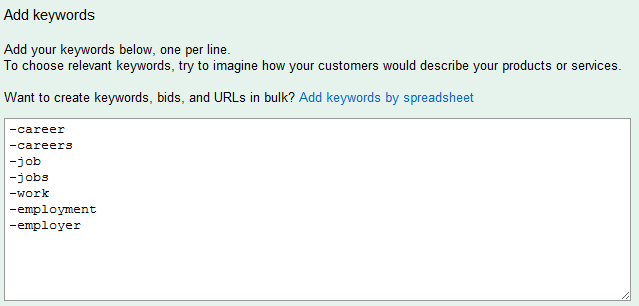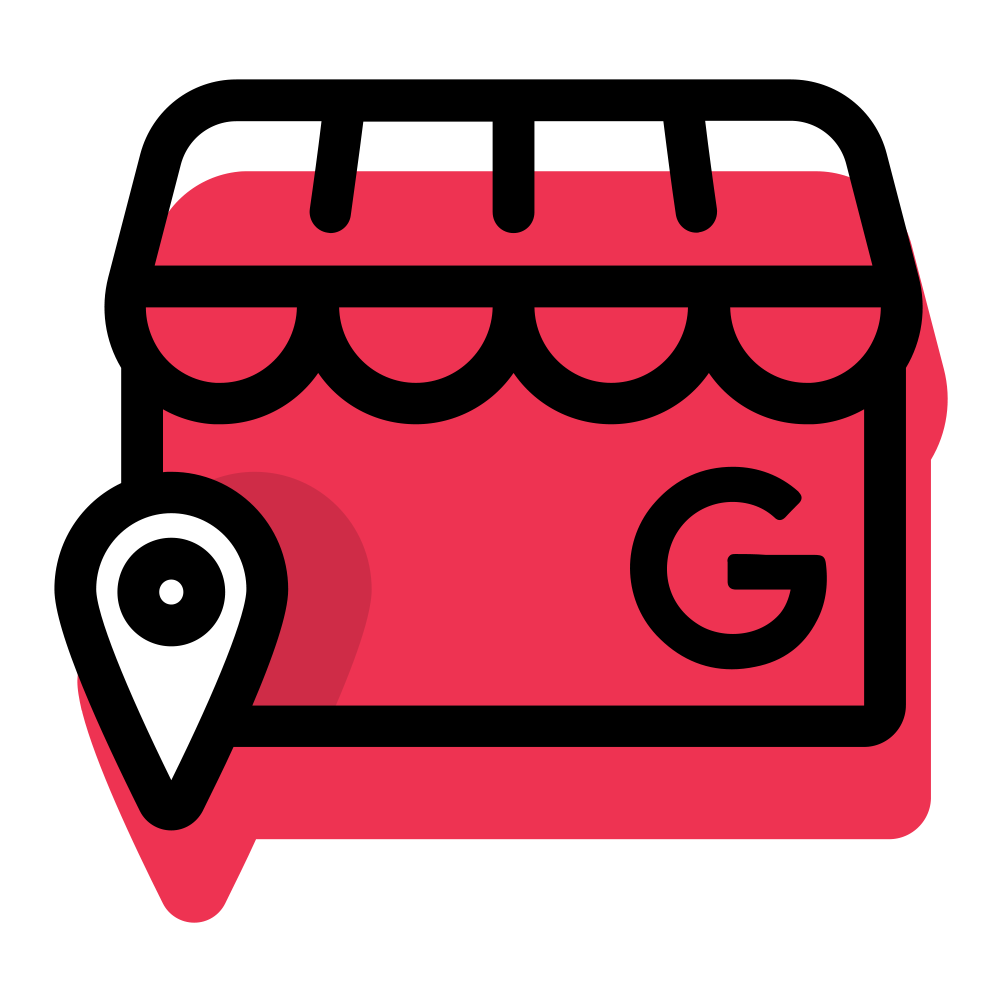
Must-Have Negative Keywords for Small Business & Local Adwords Campaigns
When you’re running an Adwords campaign for a small, local-focused business, every dollar counts. You typically don’t have much to spend, so it’s critical to focus your spend on the people most likely to become customers.
Using negative keywords helps you zero in on actual customers and stop wasting money on anyone who isn’t a good prospect for your business. When you add a keyword to the negative keyword list, your ad won’t show if that keyword is in a person’s search query.
How to add negative keywords to your local Adwords campaign
Adding negative keywords to your Adwords campaign is easy. You can do it one of two ways:
1) Simply add the keywords under the Keywords tab in the same place you add your regular keywords. To designate a negative keyword, simply add a negative sign (-) in front of it.

2) If you want to get more advanced, scroll to the bottom of the Keywords page of your Adwords campaign and expand the Negative keywords option. From here you can manage negative keywords on the ad group level or campaign level, as well as build out negative keyword lists that you can apply across different campaigns.
So what negative keywords should local Adwords campaigns use?
Employment searches – Job seekers in your industry can and will waste a huge chunk of your Adwords budget if you’re not careful. This is especially true for professional services like accountants and dentists. Assuming you’re trying to attract clients and not job applicants, you should load up on negative keywords like:
-career
-careers
-job
-jobs
-work
-employment
-employer
-salary
-salaries
-pay
-hire
-hiring
-intern
-recruiter
-recruiters
-resume
General information searches – When people perform general information searches, they’re usually at the beginning of the buying cycle.
By eliminating these searches, you are able to focus your spend on people further along in the cycle. That means they are far more likely to convert into leads or customers. To stop your ad from showing when people perform general information searches, use negative keywords like:
-what is
-articles
-what are
-how to
-pictures
-photos
-review
-reviews
Training and education searches – People looking to learn things about your industry aren’t typically good targets, unless you specifically supply education or training. Stop your ads from running on education and training searches like:
-training
-class
-classes
-course
-courses
-book
-books
-textbook
-school
-schools
-college
-university
Searches for areas you don’t serve – For locally-focused businesses, there is no point to show your ad to people outside your service area. There are a variety of ways people will search for local businesses that you should be aware of when picking negative match keywords related to areas.
- Suburb – Searches by suburb are popular in mid and large-sized cities. Depending on your city and your industry, people may not be willing to travel far to do business with you. If that is the case, use suburbs outside your market as negative keywords.
- City – Add the names of cities you don’t serve that people in your area may be searching for. For example, an Edmonton-based dry cleaner would want to add Calgary and Red Deer as negative keywords to filter out people in Edmonton looking for dry cleaning services in those cities.
- Zip code – Searches that include a zip code are common in local business searches in the USA – “lawyer in 90011” for example. As a local business, you may want to use zip codes of areas outside target market as negative keywords.
- Abbreviations – Don’t forget to add the common abbreviations of areas outside your target market. These include two letter state (GA, NY, NV, etc.) or city (LA, SF, TO, etc.) abbreviations.
The usual suspects – These are the negative keywords almost every Adwords campaign should have. These are the keywords that will be a waste of money for almost any type of campaign.
-free
-craigslist
-ebay
-kijiji
-lyrics
-youtube
-sex
-nude
-porn
-torrent
Find even more negative keywords
Once you’ve launched your Adwords campaign, be sure to continually add negative keywords to your Adwords campaign. To find irrelevant keywords that are triggering your ads, click the “see search terms” drop-down on the Keywords page.

This will give you a list of the actual keywords that users are searching that triggered your ads. When you see an irrelevant keyword in this report, add it to your negative keyword list.
Negative keywords are a great way for small and local businesses to get a higher ROI from Adwords. Stop wasting your money on Adwords, start using negative keywords.
This is a guest post from Andrew Breen, who runs Outshine Online Marketing, a Halifax online marketing company with a global client base. You can follow him on Twitter @breenandrew.













0 comments on “Must-Have Negative Keywords for Small Business & Local Adwords Campaigns”
great advice that can really save you a lot of money in your ppc accounts. Thanks! I also search for variations of the company’s brand name and see what kind of results come up. I often find a few more negative terms to add when doing so.
Great list of negative keywords. I’d add these to the list over at http://bit.ly/tcc86h. Additionally Wordstream’s negative keyword tool also provides good ideas.
Dev, thanks for the heads up on the Wordstream negative keyword tool. I’ve never used it but I plan to check it out.
Great post and yes negative keywords are essential to a solid ROI in PPC marketing. Another place I like to find negative keywords is using:
google suggest
google related terms
google insights
it always amazes me at how many adwords campaigns I take over from other ppc management companies where no one has clicked on the “see search terms” and started marking off the neg keywords.
knowing what not to rank for is just as important as knowing what to rank for.
Employment Related terms was a great negative keyword suggestion for almost every campaign.
A list of large metro ares not served (New York, Chicago, etc.) by local businesses is another standard exclusion.
Nearby, but smaller towns or named neighborhoods that are out of a the service area are another good source of negative keywords: Don’t advertise pizza delivery outside of your delivery area.
Using both campaign and ad group level keywords can be very helpful as well – at the campaign level you may use a very generic group of negative keywords, but then at the ad group level, you can use very specific negative keywords to scupt which ad and landing page customers with specific inquiries see.
It’s also easier to manage them if they aren’t in one big list.
Good idea limiting the educational words. I’m just about to start a small campaign for my first client, so will definitely add these, along with testing Wordstream tool, as Dev mentioned. Thanks, Aaron
Great post! Negative keywords are essential to laser targeted PPC campaigns. I regularly reference analytics for key phrases that slip through on phrase match and then add unwanted key phrases to the negative match list. I call this ‘PPC weeding’ and clients appreciate the focus on saving money for more targeted searches. Also agree with Karl’s point – using negative key phrases on both campaign and ad group level provide an even greater degree of accuracy and sophistication.
Thanks for the negative keyword guide. Will be interesting to test with tools like Marketing Samurai to find more negative keywords.
Good stuff, we run a cleaning company and even with adding negative keywords pretty much everyday & continually doing negative search terms – I would still estimate 80% of searches are cleaners looking for work rather than the wanted potential clients.
Great post! I had a bunch of negative keywords entered for my campaign but now I realise I have missed so many. Especially the ones relating to area searches! Question though, Should one add their business name to the negative keywords? Based on analytics it appears many searches are people who are specifically after us anyway and the search result would appear in number 1 spot organically. anyway? Cheers
Hey Craig,
I’m no PPC pro, but I think that the CTR on your branded terms is worth keeping. As I understand it, you get a huge CTR, which increases your quality score in that ad group, which has a positive impact campaign wide. The trick is to segment branded terms into their own ad group, and then bid super low on them so the clicks are dirt cheap.
Maybe a PPC pro that reads this can chime in and confirm or offer any additional advice?
If your monitoring your traffic and the keywords closely you can get a good idea of negatives to add to your list. Its great to start with a some default list and just use your head but I find just watching the traffic flow I can add new negatives on a daily basis. Great post.
Great list of negative keywords, I’ve used it many times already. I just have one comment about the keyword “free”. Initially in all of my campaigns I would immediately filter the keyword, however, I’ve had to think twice about it. For example if you have a search query “Edmonton Flowers FREE shipping” and you offer free shipping, or delivery then you may be filtering potential buyers unintentionally. Just a thought.
Some neg.words here I’ve been missing out on. Love it when I come across stuff like this, fast and to the point.
It is hard to gain an advantage in Google AdWords for highly competitive key-phrases. For my campaign, there seems to be a correlation between adding negative keywords and improved my quality score. In highly competitive markets a small improvement in quality score helps tremendously. This helps drive some of the expensive cost of my monthly ad spend on Google. Nice insights. Thanks….
Added! Thanks!
I’m submitting this article to the company that runs my ad-words campaigns right now. Thanks for the excellent info and ideas.